- Home
- Victor Pelevin
Buddha's Little Finger Page 3
Buddha's Little Finger Read online
Page 3
The door opened and two sailors in pea-jackets and rakishly flared trousers came tumbling into the room; they were hung all over with bottle-shaped hand grenades. One of them, with a moustache, was already elderly but the other was young, although his face was flaccid and anaemic. They paid not the slightest attention to the pistol in my hand.
‘Are you Fourply?’ asked the older one with the moustache.
‘I am.’
‘Here,’ said the sailor, and he held out a piece of paper folded into two.
I put the Mauser back in its holster and unfolded the paper.
Com. Fourply! Go immediately to the ‘Musical Snuffbox’ to propound our line. To assist you I am sending Zherbunov and Barbolin, experienced comrades. Babayasin’
Below the text there was an illegible seal. While I was thinking what to say, they sat down at the table.
‘Is that driver downstairs yours?’ I asked.
‘Yes,’ said the one with the moustache. ‘But we’ll take your car. What’s your name?’
‘Pyotr,’ I said, and then almost bit my tongue.
‘I’m Zherbunov,’ said the older one.
‘Barbolin,’ the younger one introduced himself. His voice was soft and almost womanish.
I sat facing them at the table. Zherbunov poured out three glasses of vodka, pushed one across to me and raised his eyes to my face. I realized that he was waiting for something.
‘Well then,’ I said, taking a grip on my glass, ‘let us drink to the victory of world revolution!’
My toast was not greeted with any great enthusiasm.
‘Of course, victory’s all very well,’ said Barbolin, ‘but what about the works?’
‘What works?’ I asked.
‘Don’t you try playing the fool with us,’ Zherbunov reproached me, ‘Babayasin told us you were issued a tin today.’
‘Ah, you’re talking about the cocaine,’ I said, reaching into the obstetrician’s bag. ‘Works is a word with many different meanings. Perhaps you’d like some ether, like William James?’
‘Who’s he?’ asked Barbolin, grasping the tin in his coarse, broad palm.
‘An English comrade.’
Zherbunov cleared his throat dubiously, but for a moment Barbolin’s face reflected one of those feelings that nineteenth-century Russian artists loved to depict when they were creating national types – the feeling that somewhere out there is a wide and wonderful world, filled with amazing and attractive things, and though you can never seriously hope to reach it yourself, you cannot help sometimes dreaming impossible dreams.
The tension disappeared as though by magic. Zherbunov opened the tin, picked up a knife from the table, scooped up a monstrous amount of the white powder and rapidly stirred it into his vodka. Barbolin did the same, first with his own glass, and then with mine.
‘Now we can do the world revolution justice,’ he said.
My face must have betrayed an element of doubt, because Zherbunov chuckled and said: ‘This goes right back to the Aurora, brother, back to the very beginning. It’s called “Baltic tea”.’
They raised their glasses and drained them at a gulp, and there was nothing left for me but to follow their example. Almost immediately my throat became numb. I lit a papyrosa and inhaled deeply, but I could not taste the smoke. We sat there without speaking for about a minute.
‘We should get going,’ Zherbunov said suddenly and rose from the table. ‘Ivan’ll freeze to death down there.’
In a state of numb torpor, I put the tin back into the bag. I hung back in the corridor, trying to find my fur hat, then put on Vorblei’s peaked cap instead. We left the apartment and set off in silence down the dimly lit staircase.
I was suddenly aware that my spirits were calm and easy, and the further I went, the calmer and easier they became. I was not thinking about the future, it was enough for me that I was not threatened by any immediate danger, and as we crossed the dark landings I gazed entranced at the incredibly beautiful snowflakes swirling in the air outside the window-panes. It occurred to me that I myself was like one of those snowflakes, and the wind of fate was bearing me onwards in the wake of the two other snowflakes in black pea-jackets who were stomping down the stairs in front of me. However, despite the euphoria that had enveloped me, I remained capable of a sober assessment of reality and was able to make one interesting observation. While I was still in Petrograd I had been curious about how the sailors managed to keep up those heavy bullet harnesses they wore. On the third-floor landing, where a solitary electric bulb was shining, I spotted several hooks on Zherbunov’s back which held his machine-gun belts together, rather in the manner of a brassiere. I immediately had a vision of Zherbunov and Barbolin preparing themselves for their next killing and helping one another with this difficult element of their toilet like two girls in a bathing hut. It seemed to me yet another proof of the feminine nature of all revolutions. I suddenly understood several of Alexander Blok’s new moods; some involuntary exclamation must have escaped my throat, because Barbolin turned around.
‘And you didn’t want to try it, you nelly,’ he said, exposing a gleaming gold tooth.
We went out into the street. Barbolin said something to the soldier sitting in the front seat of the car, opened the door and we climbed in. The car immediately moved off. Through the rounded windscreen of the passenger cabin I could see a snow-covered back and a sharp-pointed felt helmet. It was as though our carriage were being driven by one of Ibsen’s trolls. I thought that the construction of the automobile was most uncomfortable and, moreover, humiliating for the driver, who was always exposed to the elements – but perhaps this was a deliberate arrangement, so that the passengers could enjoy not only the view through the window, but also savour the inequality of the classes.
I turned towards the side window. The street was empty and the snow falling on to the roadway was exceptionally beautiful. It was illuminated by widely spaced street lamps; by the light of one of them I caught a glimpse of a phrase of graffiti boldly daubed on the wall of a house: ‘LENINE EST MERDE’.
When the automobile braked to a halt, I was already feeling a little more normal. We alighted on an unfamiliar street beside an entirely undistinguished-looking gateway in a wall, in front of which stood a couple of automobiles and several smart cabs. A little further off I noticed a frightening-looking armoured car with its machine-gun turret buried under a cap of snow, but I had no time for a closer look, for the sailors had already plunged into the gateway. We walked across an inexpressibly bleak courtyard and found ourselves facing a door surmounted by a protruding canopy with volutes and cherubs in the old merchant style. A small signboard had been hung on the canopy: ‘THE MUSICAL SNUFFBOX: LITERARY CABARET’.
There was light showing through the pink curtains drawn tightly across several windows beside the door: from behind them I could hear the plaintively beautiful note of some obscure musical instrument.
Zherbunov tugged the door open sharply, revealing behind it a short corridor hung with fur coats and greatcoats, which ended in a heavy velvet curtain. A man wearing a simple Russian shirt and looking like a convict rose from a stool to meet us.
‘Citizen sailors,’ he began, ‘we don’t…’
With the agility of a circus acrobat Barbolin swung his rifle around his shoulder and struck him with the butt in the base of his belly; the attendant slid down the wall and on to the floor, his hostile face suddenly expressive of weariness and revulsion. Zherbunov pulled aside the curtain, and we entered a dimly lit hall.
Feeling myself fired by an unusual burst of energy, I looked around. The place looked like an ordinary run-of-the-mill restaurant with some pretensions to chic, and the public seated among the dense clouds of smoke at small round tables was quite varied. There was a smell of opium. Nobody took any notice of us, and we sat at a small table not far from the entrance.
The hall was bounded on one side by a brightly lit stage, on which a clean-shaven gentleman in evening dress, with
one bare foot, was sitting on a black velvet stool. He was sliding the bow he held in his right hand across the smooth edge of a long saw, one handle of which was pressed against the floor by his foot while the other was gripped tightly in his left hand, so that the saw bent into a trembling curve. When he needed to dampen the vibration of the gleaming strip of metal, he would press his bare foot against it for a second. Beside him on the floor stood a patent-leather shoe with a blindingly white sock protruding from it. The sound which the gentleman extracted from his instrument was absolutely unearthly, at once doleful and enchanting. I think he was playing a simple melody, but that was not important; what mattered was the timbre, the modulations of a single note that faded away over an eternity and pierced straight to the very centre of my heart.
The door-curtain at the entrance quivered and the man in the Russian shirt stuck his head and shoulders out from behind it. He clicked his fingers somewhere off into the darkness and nodded towards our table. Then he turned towards us, gave a short, formal bow and disappeared back behind the curtain. Immediately a waiter emerged out of somewhere with a tray in one hand and a copper teapot in the other (there were identical teapots standing on the other tables). The tray held a dish of small pies, three teacups and a tiny whistle. The waiter set the cups out in front of us, filled them from the teapot and then froze in motionless anticipation. I held out a bill drawn at random from my travelling bag – I think it was a ten-dollar note. I could not understand at first what the whistle was doing on the tray, but then I heard a melodic whistling from one of the neighbouring tables, and saw a waiter come dashing over at the sound.
Zherbunov swallowed a mouthful of liquid from his cup and grimaced in distaste. Then I tried a sip from mine. It was khanja, a bad Chinese vodka made from kaoliang. I started chewing on a pie, but I could not taste it at all; the freezing effect on my throat of the cocaine had still not worn off.
‘What’s in the pies?’ Barbolin asked gingerly. ‘People keep disappearing these days, after all. I don’t feel like breaking my fast that way.’
‘I tried it once,’ Zherbunov said simply. ‘It’s like beef.’
Unable to bear any more of this, I took out the tin box and Barbolin set about stirring the powder into our cups.
Meanwhile the gentleman in evening dress finished playing, donned his sock and shoe with elegant rapidity, stood up, bowed, picked up the stool and quit the stage to the sound of scattered applause. A handsome-looking man with a small grey beard got up from a table beside the stage. His throat was wrapped in a grey scarf as though to conceal a love bite. I was astonished to recognize him as the poet Valery Briusov, now old and emaciated. He mounted the stage and turned to face the hall.
‘Comrades! Although we live in a visual age, in which lines of printed words are being supplanted by sequences of images or…hmm…,’ he declaimed, ‘still tradition does not abandon the struggle, but seeks to discover new forms. To this day the immortal Dostoevsky and his novel Crime and Punishment continue to inspire young seekers of truth, both with axes to grind and without. And so now a little tragedy – that is the precise definition of this play’s genre, according to the author himself, the chamber poet Ioann Pavlukhin. Ladies and gentlemen, your attention please for the little tragedy Raskolnikov and Marmeladov.’
‘Your attention please,’ echoed Zherbunov, and we drank.
Briusov left the stage and returned to his table. Two men in military uniform carried a massive gilded lyre on a stand and a stool out on to the stage from the wings. Then they brought out a table, stood a pot-bellied liqueur bottle and two glasses on it, and pinned up two pieces of cardboard at either side of the stage, bearing the words ‘Raskolnikov’ and ‘Harmeladov’ (I immediately decided that the misspelling of the second name was not a mistake but a symbol of some kind), and finally they hung a board bearing the incomprehensible word ‘yhvy’ in the centre of the stage. Having duly situated all of these objects in their places, they disappeared. A woman in a long tunic emerged from the wings and began running leisurely fingers over the strings of the lyre. Several minutes passed in this fashion before a quartet of individuals in long black cloaks appeared on stage. Each of them went down on one knee and raised a black hem to conceal his face from the audience. Someone applauded. At the opposite end of the stage two figures appeared wearing tall buskins, long white robes and Greek masks. They began slowly moving towards each other, but stopped before they came close. One of them had an axe hanging under his arm in a noose entwined with roses – I realized that he was Raskolnikov. This, in fact, was obvious enough without the axe, because the board bearing his name was hanging by the wings on his side of the stage.
The other figure halted, slowly raised his arm in the air and began intoning in ponderous hexameters. In almost exactly the same words as his drunken prototype in the novel, he confessed that he had nowhere left to turn, then declared that Raskolnikov’s blazing eyes betrayed a keen sensibility of the woes of the downtrodden and oppressed, and immediately suggested that they should drink to that (this was indeed a revolutionary innovation).
The actor with the axe declined curtly. Marmeladov quickly drained his glass and continued his oration, paying Raskolnikov a long and confused compliment, in which I found several of the images quite effective – for instance that of the arrogant strength of emptiness blossoming behind the hero’s eyes and lending his face a semblance of the visage of God.
On hearing the word ‘God’, Zherbunov nudged me with his elbow.
‘What d’you reckon?’ he asked in a low voice.
‘It is still too soon,’ I whispered in reply. ‘Carry on watching.’
Marmeladov’s meaning grew more and more ambiguous. Dark hints began to surface in the flow of his words: a comparison of the grey St Petersburg morning with a blow from an axe to the back of the head, of his own world-weary soul with a dark closet in which the bodies of dead women lay. At this, Raskolnikov began showing clear signs of nervousness, and he enquired what Marmeladov wanted of him. In some confusion, Marmeladov asked him to sell the axe.
In the meantime I surveyed the hall. There were three or four people at each round table; the customers were a very mixed bunch, but as has always been the case throughout the history of humanity, it was pig-faced speculators and expensively dressed whores who predominated. Sitting at the same table as Briusov, and grown noticeably fatter since the last time I had seen him, was Alexei Tolstoy, wearing a big bow instead of a normal tie. The fat that had accumulated on him seemed to have been pumped from the skeletal frame of Briusov: together they looked quite horrific.
Looking further, at one of the tables I noticed a strange man sporting a military blouse criss-crossed with belts and an upturned handlebar moustache. He was alone at his table, and instead of a teapot there was a bottle of champagne standing in front of him. I decided that he must be a big Bolshevik boss. I do not know what it was in his calm, powerful face that struck me as unusual, but for several seconds I was unable to take my gaze off him. His eyes met mine, but he immediately turned away to face the stage, where the meaningless dialogue was continuing.
Raskolnikov attempted to discover for what purpose Marmeladov required the axe and received replies couched in vague, flowery phrases about youth, the Grail, eternity, power, hope and – for some strange reason – the phases of the moon. Eventually Raskolnikov capitulated and handed over the axe. He was counting the wad of bills that Marmeladov had given him in payment, when he suddenly swayed back and froze in astonishment. He had noticed that Marmeladov was standing there in front of him wearing a mask. Still speaking in the same laboured hexameters, he began asking Marmeladov to remove the mask. I was particularly struck by one image which he used, ‘Your eyes are like two yellow stars’ – Briusov broke into applause at the words, but overall it was far too long and drawn out. After Raskolnikov had repeated his request for the third time, Marmeladov paused in silence for a long, terrible moment before tearing the mask from his face. Simultaneously the
tunic attached to the mask was torn from his body, revealing a woman dressed in lacy knickers and a brassiere, sporting a silvery wig with a rat’s-tail plait.
‘Oh God!…The old woman! And I am empty-handed…’ Having pronounced these final words in an almost inaudible voice, Raskolnikov slumped to the floor from the full height of his buskins.
What followed made me blench. Two violinists leapt out on to the stage and began frenziedly playing some gypsy melody, while the Marmeladov woman threw her tunic over Raskolnikov, leapt on to his chest and began strangling him, wiggling her lace-clad bottom to and fro in excitement.
For a moment I thought that what was happening was the result of some monstrous conspiracy, and that everybody was looking in my direction. I glanced around like a beast at bay, my eyes once again met those of the man in the black military blouse, and I somehow suddenly realized that he knew all about the death of Vorblei – that he knew, in fact, far more serious things about me than just that.
At that moment I came close to leaping up from my chair and taking to my heels, and it took a monstrous effort of will to remain sitting at the table. The audience was applauding feebly; several of them were laughing and pointing at the stage, but most were absorbed in their own conversations and their vodka.
Having strangled Raskolnikov, the woman in the wig bounded over to the front of the stage and began dancing wildly to the insane accompaniment of the two violins, kicking her naked legs up towards the ceiling and waving the axe. The four figures in black, who had remained motionless throughout the play, now took hold of Raskolnikov, still covered by the tunic, and carried him into the wings. I had a faint inkling that this was a reference to the very end of Hamlet, where there is a mention of four captains who are supposed to carry away the dead prince. Strangely enough, this thought brought me to my senses straight away. I realized that what was happening was not a conspiracy against me – nobody could possibly have arranged it all in the time which had passed – but a perfectly ordinary mystical challenge. Immediately deciding to accept it, I turned to the two sailors, who had by this time retreated into themselves.

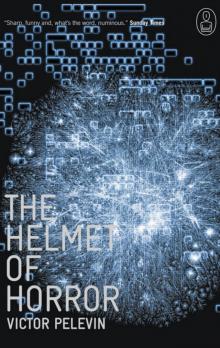 The Helmet of Horror
The Helmet of Horror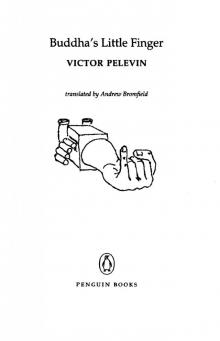 Buddha's Little Finger
Buddha's Little Finger Empire V
Empire V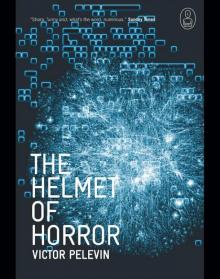 Helmet of Horror
Helmet of Horror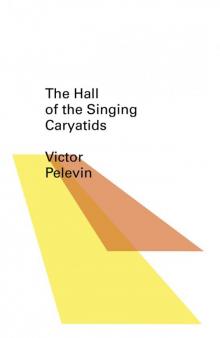 The Hall of the Singing Caryatids
The Hall of the Singing Caryatids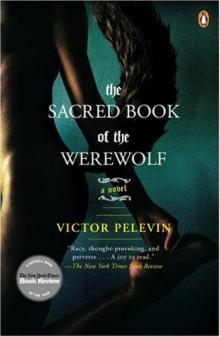 The Sacred Book of the Werewolf
The Sacred Book of the Werewolf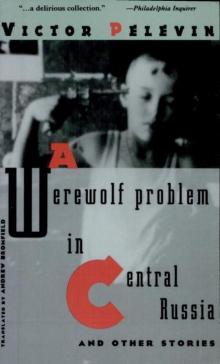 A Werewolf Problem in Central Russia and Other Stories
A Werewolf Problem in Central Russia and Other Stories